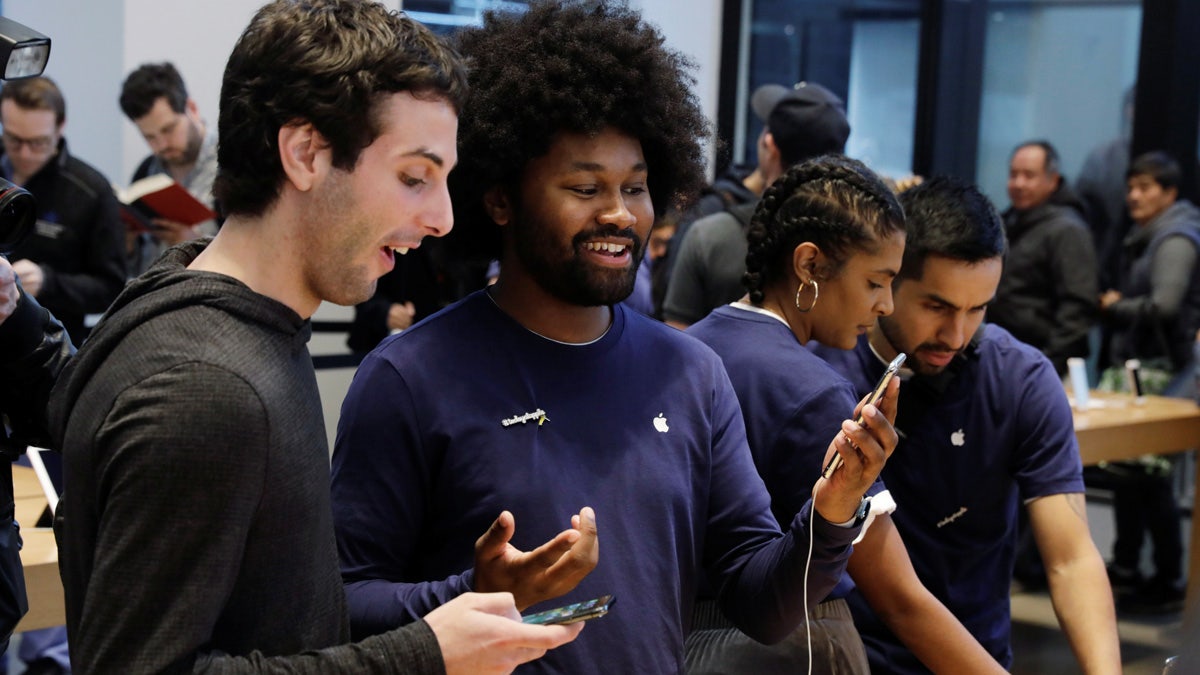
File photo: An Apple sales associate speaks with a customer waiting to purchase a new iPhone X in New York, U.S., November 3, 2017. (REUTERS/Lucas Jackson)
U.S. Senator John Thune, R.-S.D., has requested more information from Apple and its CEO, Tim Cook, on the company's process for slowing down older iPhones.
In a letter, Thune has asked Apple if the tech giant made any effort to notify its customers that its recent software updates would make several types of iPhones released before 2017 slow down when their batteries weakened.
Thune also asked Apple whether it considered replacing the batteries for free, instead of the current discounted charge of $29 that it began offering in late December after acknowledging how its updates affected older iPhones. Thune demanded a response by Jan. 23.
APPLE UNDER FIRE IN FRANCE FOR 'PLANNED OBSOLENCE,' COULD FACE BIG FINES
Last month, the company apologized after it caused an uproar when it admitted it had slowed down batteries on older iPhones for technical reasons. The tech giant also said it would cut the cost of replacing iPhone batteries, to $29, down from $79.
"We’ve been hearing feedback from our customers about the way we handle performance for iPhones with older batteries and how we have communicated that process," Apple said in a statement posted to its website. "We know that some of you feel Apple has let you down. We apologize. There’s been a lot of misunderstanding about this issue, so we would like to clarify and let you know about some changes we’re making."
The slowdown started with iOS 10.2.1 in 2016, Apple said, to improve power management "to avoid unexpected shutdowns on iPhone 6, iPhone 6 Plus, iPhone 6s, iPhone 6s Plus, and iPhone SE."
With the recent iOS 11.2 update, both the iPhone 7 and 7 Plus got the same power management support as well.
The apology came after the Tim Cook-led company admitted it slowed down older iPhones to help save battery life due to the limitations of lithium-ion batteries.
In the statement, Apple, which has previously mentioned how lithium-ion batteries degrade over time, provided more detail on how the batteries work.
APPLE DEFENDS ITSELF AMID OUTCRY OVER CHILDREN'S USE OF SMARTPHONES
"All rechargeable batteries are consumable components that become less effective as they chemically age and their ability to hold a charge diminishes," the company said, while adding that both time and the number of times the battery has been charged affect the chemical aging process.
The company is the subject of several class-action lawsuits over the matter, including one filed in Los Angeles by Stefan Bogdanovich, an iPhone 8 user. Bogdanovich said that Apple's slowing down of older iPhone models is not part of an agreement and he believes it is a ploy by Apple to get people to upgrade to new phones.
Apple is also facing scrutiny from two of its institutional investors, both of whom have asked the company to do more to ease the addictive nature of its iPhones among children. The company has responded to these claims, saying it already has plans in place and will issue updates in the future to give parents further control.
The Associated Press contributed to this report. Follow Chris Ciaccia on Twitter @Chris_Ciaccia








































